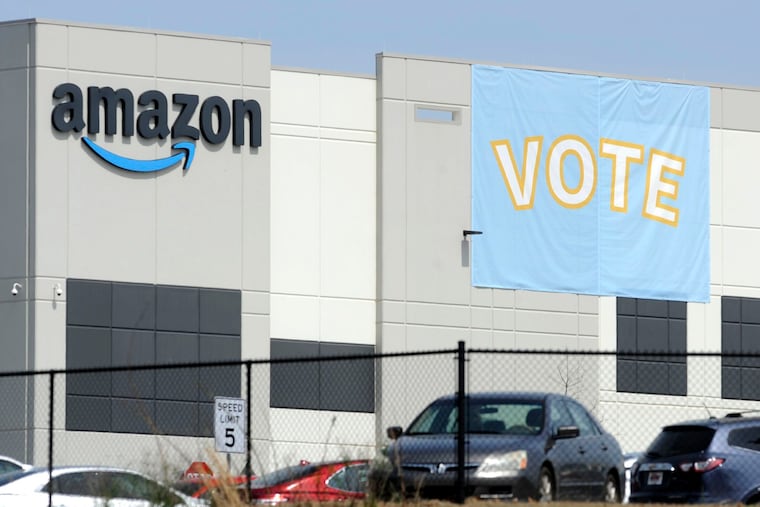The failure to unionize Amazon is the union’s own fault | Opinion
Workers don’t always buy the value proposition from a union.

Whenever a union loses an election, there is a tendency to blame it on the employer’s “anti-union animus.” This has been the refrain by some trying to rationalize the Retail, Wholesale and Department Store Union’s (RWDSU) resounding loss at the Amazon site in Bessemer Alabama, including in opinion pieces published by this newspaper. Such a sentiment couldn’t be more wrong.
Employers, at least for now, have free speech rights about why their place of business and their employees would be better off continuing the direct relationship between management and workers without a third party involved. In other words, employers get to tell their side of the story to workers, just as the union gets to tell their side of the story. This right is not anti-union bias. It is how we conduct elections in this country. Both sides get to make their case and the voters get to make a fully informed and free choice. And that is how it should be.
» READ MORE: Amazon’s dystopian antiunion working conditions are not what Philadelphians deserve | Opinion
Yet labor still cries foul when they lose and points to employers improperly influencing employees with information. The reality is that employers are limited in what they can say to their employees during a union campaign. The law requires that they provide nothing more than facts, their opinion, and real-world examples of their position. The union, on the other hand, is not bound by these constraints and can make promises they often cannot guarantee. Is it fair to the employee-voters to hear only one side of the story, and potential false promises?
To be sure, there are instances where unions might be mutually beneficial for the employer-employee relationship. But most employers work hard to treat their employees well and pay a fair wage. In the age of instant communication, the market will punish those employers who fail to recognize this or are not flexible enough to change.
Today, companies and their employees are nimble. Change happens too rapidly to be otherwise. Automation and artificial intelligence (AI), for example, are here to stay. Good companies have embraced technology and immediate customer feedback and are working to retrain employees to work in this new world. Alternatively, some employees are attracted to the gig economy and the freedom and flexibility it allows, and this has impacted businesses everywhere. Many in organized labor still prefer to conduct business the old way with the heavy emphasis on inflexible job classifications and reliance on seniority to the detriment of skills and qualifications.
Private sector unionization has been steadily declining in this country since its peak around 1950. Union membership in private businesses is well below 7% of the workforce. To offset this trend, instead of evolving with the market, labor has turned to the government for legislation such as the earlier, misnamed, Employee Free Choice Act (EFCA) or the currently pending Protecting the Right to Organize (PRO) Act, that, if passed, could have a deleterious effect on the economy and move to take the power of choice away from employees.
» READ MORE: Amazon now encircles the Philadelphia region with over 50 warehouses
Unions in this country once played a pivotal role in helping to ensure safe and fair workplaces but in many respects, they became victims of their own disruptive success. Legislation such as the Civil Rights Act, and agencies like the Occupational Safety and Health Administration (OSHA) and its counterpart for mining, the Mine Safety and Health Administration (MSHA) took the place of organized labor in ensuring worker protection. So, too, has the workplace evolved with the advent of professional Human Resource departments dedicated to employee relations. Further, unions face stiff competition from digital platforms that offer workers much of the same assistance that unions traditionally have. Unions themselves have been disrupted.
Today, as appears to have been the case in Bessemer, workers don’t always buy the value proposition from a union. AFL-CIO leadership recently acknowledged that AI in the workplace could be the next frontier for the labor movement. That is at least some acknowledgement that labor needs to flex to the future if it will play any role in the American workplace. However, continuing to create an us against them atmosphere, not recognizing the need to better work with management, playing the same tired “blame the employer” game when employees exercise their free choice not to unionize, or, worst of all, actively working to change the rules so that employees lose any right to make an informed decision, will not in the long run change the downward spiral. Rather, it might be better to look in the mirror.
Rick Grimaldi is a partner at Fisher Phillips and the author of “FLEX: A Leader’s Guide to Staying Nimble and Mastering Transformative Change in the American Workplace.” He previously served as deputy general counsel to Governor Tom Ridge. rgrimaldi@fisherphillips.com
.